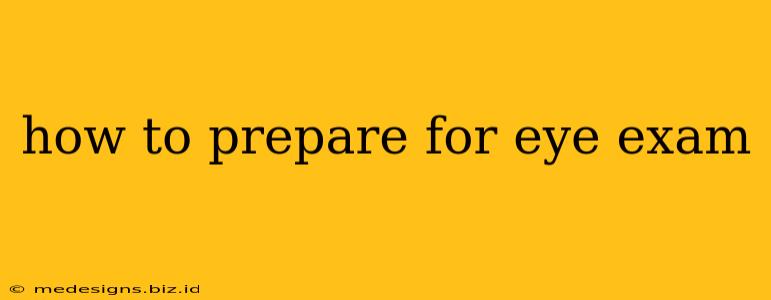Preparing for your eye exam might seem simple, but a little preparation can significantly improve the accuracy and efficiency of the examination. This guide will walk you through everything you need to know to ensure you get the most out of your appointment.
Before Your Eye Exam: Key Preparations
1. Know Your Medical History:
Before heading to your appointment, gather information about your medical history, including any existing eye conditions, family history of eye diseases (like glaucoma or macular degeneration), and any medications you are currently taking (including over-the-counter drugs). This information is crucial for your eye doctor to provide the best possible care. Be sure to list any allergies you have as well.
2. List Your Symptoms (if applicable):
If you're visiting the ophthalmologist due to specific symptoms like blurry vision, headaches, eye pain, or double vision, make a note of when these symptoms started, how often they occur, and any factors that seem to worsen or improve them. This detailed information will help your doctor pinpoint the potential cause of your discomfort.
3. Prepare Your Questions:
Think about any questions you have for your eye doctor. This could range from concerns about your vision to questions about specific eye conditions or treatments. Writing them down beforehand ensures you don't forget anything important during your appointment. Don't hesitate to ask about preventative care, too!
4. Consider Your Current Eyeglasses or Contact Lenses:
If you currently wear glasses or contact lenses, bring them with you to your appointment. This allows your doctor to check their prescription and assess their fit. Also, bring the cases for your contact lenses for hygienic reasons.
5. Schedule Appropriately:
Eye exams can take time, particularly comprehensive ones. Schedule your appointment at a time that allows for a relaxed and thorough examination. Rushing through the appointment can compromise its effectiveness.
On the Day of Your Eye Exam: What to Expect
-
Arrive on Time: Punctuality ensures that your doctor can allocate the appropriate time to your examination.
-
Contact Lens Considerations: If you wear contact lenses, your doctor may ask you to remove them before the exam, allowing for a more accurate assessment of your eyes' natural state. Follow their instructions carefully.
-
Comfortable Attire: Wear comfortable clothing, as you may need to remove some garments during certain parts of the examination.
-
Relax and Communicate: Communicate openly with your doctor. Don't hesitate to express any concerns or discomfort you experience during the exam. A relaxed patient allows for a more accurate assessment.
Understanding Different Types of Eye Exams
There are several types of eye exams, each serving a different purpose. Understanding the type of exam you are having helps you prepare accordingly. These may include:
-
Comprehensive Eye Exam: This is a thorough examination that checks your overall eye health and vision.
-
Routine Eye Exam: A shorter exam focusing primarily on your refractive error (nearsightedness, farsightedness, astigmatism).
Following Up After Your Eye Exam
After your eye exam, your doctor will likely provide you with a detailed explanation of the results and any recommendations for treatment or follow-up care. Be sure to ask clarifying questions if needed and schedule any recommended follow-up appointments promptly.
By following these steps, you can ensure you're well-prepared for your eye exam and receive the best possible care. Remember, proactive eye care is essential for maintaining good vision throughout your life.
